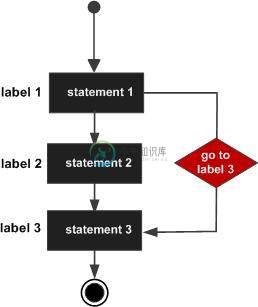goto statement
优质
小牛编辑
134浏览
2023-12-01
goto语句提供从goto到同一函数中带标签语句的无条件跳转。
NOTE - 强烈建议不要使用goto语句,因为它很难跟踪程序的控制流程,使程序难以理解且难以修改。 任何使用goto的程序都可以被重写,因此它不需要goto。
语法 (Syntax)
C ++中goto语句的语法是 -
goto label;
..
.
label: statement;
其中label是标识标签语句的标识符。 带标签的语句是任何前面带有标识符后跟冒号(:)的语句。
流程图 (Flow Diagram)

例子 (Example)
#include <iostream>
using namespace std;
int main () {
// Local variable declaration:
int a = 10;
// do loop execution
LOOP:do {
if( a == 15) {
// skip the iteration.
a = a + 1;
goto LOOP;
}
cout << "value of a: " << a << endl;
a = a + 1;
}
while( a < 20 );
return 0;
}
编译并执行上述代码时,会产生以下结果 -
value of a: 10
value of a: 11
value of a: 12
value of a: 13
value of a: 14
value of a: 16
value of a: 17
value of a: 18
value of a: 19
goto的一个好用途是退出深度嵌套的例程。 例如,考虑以下代码片段 -
for(...) {
for(...) {
while(...) {
if(...) goto stop;
.
.
.
}
}
}
stop:
cout << "Error in program.\n";
消除goto会强制执行许多额外的测试。 一个简单的break语句在这里不起作用,因为它只会导致程序退出最内层的循环。

